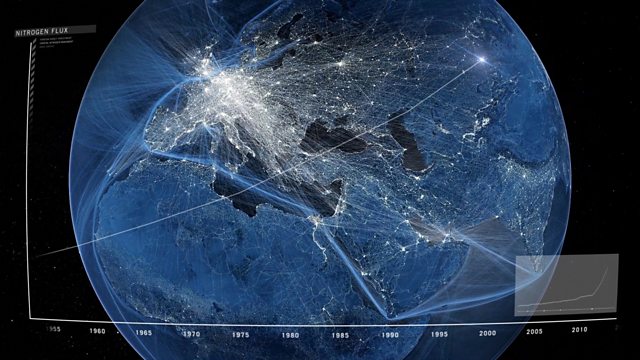The Age We Made - Part 1
Humanity's impact on the planet is so profound that we're creating a new geological time period, say geologists. They have named the age we're making, the Anthropocene.
Humanity’s impact on the Earth is so profound that we’re creating a new geological time period. Geologists have named the age we’re making the Anthropocene. The changes we’re making to the atmosphere, oceans, landscape and living things will leap out of the rocks forming today to Earth scientists of the far future, as clearly as the giant meteorite that ended the Age of the Dinosaurs does to today’s researchers. In this four part series, journalist Gaia Vince looks at the impact of these planetary transformations from the perspective of geological time. When was the last time comparable events happened in Earth history, and are what are the key marks we’re making on the planet that define the Anthropocene?
In this first programme, Gaia hears how the hand of humanity on the surface of the continent is geological in its sheer scale and its imprint will remain for millions of years. Through mining and quarrying, we shift billions more tonnes rock and sediment annually than all of the planet’s great rivers and glaciers combined. We are creating new strata in patterns Mother Earth never intended.
By turning 40% of the land from wild habitat to food production and then discovering how to turn the atmosphere’s nitrogen into synthetic fertiliser, we’ve become the biggest thing to happen to the whole planet’s nitrogen cycle in 2 billion years.
That’s not only causing immediate and serious environmental problems such as oxygen-depleted dead zones in coastal areas and the acceleration of climate change, our rock-shifting and nitrogenous activities will be preserved in the rocks of the future geological record for posterity. Our sedimentary and geochemical signals are exactly the kind geologists use to mark where one period of Earth history ends and another begins.
Presented by Gaia Vince
Produced by Andrew Luck-Baker
(Image: Anthropocene data visualisation. Credit: International Geosphere-Biosphere Programme and Globaia)
Last on
More episodes
Previous
Broadcasts
- Mon 22 Oct 2012 18:32GMTÂ鶹ԼÅÄ World Service Online
- Tue 23 Oct 2012 03:32GMTÂ鶹ԼÅÄ World Service Online
- Tue 23 Oct 2012 10:32GMTÂ鶹ԼÅÄ World Service Online
Space
The eclipses, spacecraft and astronauts changing our view of the Universe
The Curious Cases of Rutherford and Fry
Podcast
-
![]()
Discovery
Explorations in the world of science.



